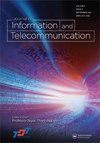一种基于模糊的VANET中有效隐私保护和安全认证的信任评估框架
IF 1.7
Q2 COMPUTER SCIENCE, INFORMATION SYSTEMS
Journal of Information and Telecommunication
Pub Date : 2022-03-06
DOI:10.1080/24751839.2022.2040898
引用次数: 5
摘要
车载自组织网络(VANET)是一种新增加的智能车辆技术,旨在确保安全并减少时间消耗。尽管它节省了时间并保证了旅行的安全,但安全和隐私是VANET中最困难的问题。此外,这是由于这些方法利用了公钥基础设施、群签名等,同时,黑客可以通过侧通道攻击获取通常保存在防篡改设备中的敏感数据。VANET还存在一些与安全相关的问题。为了避免这种情况,我们提出了一种有效的隐私保护和基于模糊的信任评估方案。这种方法确保了VANET的安全性和真实性。为了确保安全性,我们提出的方法使用了一种改进的椭圆曲线密码(ECC)方法,该方法还降低了传统ECC产生的计算复杂性。在我们提出的方法中,更频繁地更新TPD参数以消除攻击,并允许批量验证方法来减少时间。在Matlab模拟器中从计算成本、通信成本、可信度评估、隐私保护等方面进行了实验分析。实验分析表明,该方法具有94%的可信度和时间消耗,并在很大程度上降低了通信开销。本文章由计算机程序翻译,如有差异,请以英文原文为准。
A fuzzy-based trust evaluation framework for efficient privacy preservation and secure authentication in VANET
ABSTRACT The Vehicular Adhoc Network (VANET) is a newly added smart technique in vehicles to ensure safety and reduce time consumption. Even though it saves time and guarantees safe travel, security and privacy are the most difficult issues in the VANET. Moreover, this is due to the fact that the methods exploit public key infrastructure, group signature, etc., Meanwhile, the hackers can acquire the sensitive data’s which are usually kept in the tamper-proof devices by using side-channel attacks. The VANET also possesses several security-related issues. To circumvent this we propose an efficient privacy-preserving and fuzzy-based trust evaluation scheme. This method ensures the security and authenticity of the VANET. To ensure security our proposed method utilizes a modified Elliptical Curve cryptographic (ECC) method which also reduces the computational complexities created by the conventional ECC. In our proposed method the TPD parameters are renewed more often to eliminate the attacks and permits batch verification methods to reduce the time. The experimental analysis is conducted in Matlab simulator in terms of computational cost, communication cost, evaluation of trustworthiness, privacy protection. The experimental analysis shows that proposed method provides 94% of trustworthiness and time consumption and communication overheads are reduced to greater extent.
求助全文
通过发布文献求助,成功后即可免费获取论文全文。
去求助
来源期刊
CiteScore
7.50
自引率
0.00%
发文量
18
审稿时长
27 weeks

 求助内容:
求助内容: 应助结果提醒方式:
应助结果提醒方式:


